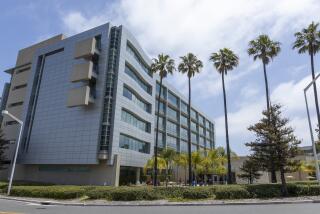Female scientists at Salk Institute claim gender discrimination, ‘old boys club’
- Share via
Renowned scientists Vicki Lundblad and Katherine Jones this week sued their employer, the Salk Institute, alleging that they and other women have suffered long-term gender discrimination at the La Jolla science center.
Their lawsuits claim that the institute has long been an “old boys club” with “a culture where women are paid less, not promoted and denied opportunities and benefits simply because they are women.”
Lundblad and Jones also alleged that they have faced pressure to downsize their laboratories even though they’ve done well in bringing in research money.
They accused Salk administrators of not promoting any female scientist to the rank of full professor since 1999, of retaliating against them for their complaints and of not responding seriously to changes proposed by Nobel laureate Elizabeth Blackburn, the institute’s current president who joined the Salk in late 2015.
In a statement, the Salk Institute for Biological Studies said: “Drs. Jones and Lundblad, whose laboratories have received over $5 million in support from the institute over the past 10 fiscal years, have been treated generously by the institute, including relative to their male peers. Each scientist’s lucrative compensation package is consistent with well-recognized metrics that have been applied to all Salk faculty in a nondiscriminatory manner.”
A spokesman for the institute said that in light of the pending litigation, it wouldn’t make any comments beyond the statement.
Efforts to obtain a response Wednesday from Irwin Jacobs, who served as Salk’s chairman for the last decade before stepping down late last year, were unsuccessful, as were attempts to reach several faculty members.
In their lawsuits, Lundblad and Jones cited 50 defendants — a significant number given the Salk’s small faculty and overall staff.
Lundblad and Jones didn’t offer comments outside of their lawsuits Thursday, but have agreed to an interview Friday with the San Diego Union-Tribune.
Since opening in 1963, the seaside institute has consistently garnered international attention for its pioneering advancements in basic science. It was founded by Jonas Salk, who developed the world’s first effective and safe vaccine against polio.
Over the decades, the Salk Institute has been home to acclaimed researchers in a variety of fields. Its faculty members are known for their exploration of viruses, the brain, stem cells, cancer, diabetes, plant biology and other biomedical topics.
In the public’s eyes, the institute isn’t linked with gender turmoil. But in their lawsuits, Lundblad and Jones claimed systematic discrimination against female scientists.
“Because of the lack of formal governing guidelines to ensure equitable treatment of women faculty, the Salk Institute’s administration has historically demonstrated a lack of desire to address, or even admit, the problems encountered by its tenured women professors,” the lawsuits said.
The plaintiffs are seeking unspecified compensation in addition to attorney’s fees.
Lundblad, 64, is a molecular and cell biologist who has done groundbreaking studies of how telomeres, the protective tips of chromosomes, factor into aging and cancer.
Telomeres wear down with each cellular division, until the cell stops dividing. That’s a safeguard against unlimited growth, which can lead to cancer. However, premature loss of telomeres sends cells into senescence — when they no longer divide and grow, and this milestone hastens aging.
Lundblad, who joined the institute in 2003, has performed research on telomerase, an enzyme that rebuilds telomeres. That’s also Blackburn’s specialty; she was awarded her Nobel Prize in 2009 for telomerase research.
Lundblad’s work, performed in yeast, has catalyzed similar research into how the enzyme acts in human cells. In 2015, she was elected to the National Academy of Sciences, the elite society formed during the Lincoln administration to advise the government on science and technology.
Jones is a biologist who has done widely cited research on how to fight cancer, and has conducted studies that have helped to explain how dormant HIV infections can become active. She has spent her entire 30-year career at the Salk Institute.
She specializes in a field called transcription elongation, which controls the activity of genes in HIV and cancer. Her analyses revealed how a protein called Tat is activated to cause HIV replication; inhibiting this mechanism could lead to new drugs to control HIV.
In other research, Jones determined how stem cells use two molecular pathways to guide their growth into mature cells. This knowledge may help stem cell scientists gain efficiency and get more predictable results in coaxing these cells into developing into specific tissues.
Robbins and Fikes write for the San Diego Union-Tribune
More to Read
Sign up for Essential California
The most important California stories and recommendations in your inbox every morning.
You may occasionally receive promotional content from the Los Angeles Times.













